![]() 1st Battalion 22nd Infantry
1st Battalion 22nd Infantry ![]()
Fort Hood, Texas
TASK FORCE REGULARS
1/22 Deploys to GITMO, Cuba
March 20, 2002
Elements of the 1st Battalion, 22nd Infantry Regiment, 4th Infantry Division, will be sent to the US Naval Base at Guantanamo Bay, Cuba in the weeks to come. Soldiers from 1/22 will provide external security for Camp X-Ray, where Taliban and al-Qaida prisoners are being held. The formation will be led by Major Brian Reed, the Battalion Operations Officer, and will be known as "Task Force Regulars". Before deploying, Task Force Regulars will be trained in riot and crowd control operations. Currently US Army Military Police units are engaged in the security of the detainees, and US Marines are guarding the camp's perimeter. The First Battalion will take over the duty from the Marines and be responsible for the perimeter and external security of the Camp.
Thanks to Anne Legare for the above info on 1st BN's deployment.
Task Force Regulars to Cuba on April 6, 2002
At 0400 on Saturday morning, April 6, 2002, Task Force Regulars mustered in the Raider Brigade Fieldhouse to prepare for movement by air to Guantanamo Bay, Cuba to assume the duty of perimeter security for the Taliban and Al Queda prison compound. The 200 person strong task force, led by 1-22 S-3 MAJ Brian Reed, consisted of men of Company B, 1-22 Infantry led by CPT Jason Wesbrock plus elements of Company C, the Recon platoon, and support forces.
This was the first tactical deployment of 1-22 since their successful mission in Haiti in September 1994 throughJanuary 1995. It is also a return to the place where our Regiment earned a battle streamer in the Spanish-American War in July 1898. In less than three weeks after returning from a month long deployment to the National Training Center where they trained in mechanized warfighting with the latest technology and most lethal weapons and tactical systems in the world today, the troops of 1-22 Infantry responded to their new mission and quickly switched gears to riot training, crowd control, and working without their Bradley fighting vehicles.
Along with their perimeter security mission, they will be responsible to help move the prison compound to an expanded facility that will accommodate more prisoners being brought in from Afghanistan. Family members, just as many of us have experienced in past wars and deployments, stayed with the troops to bid them farewell and Godspeed until they disappeared behind the curtains and began the manifest process prior to departing for the airfield. MG Raymond Odierno, CG of the 4th Infantry Division, told the families and troops that this is a very important role these troops are taking on in the war against terrorism.
Awb Norris, CO/2-22 VN, Bill Bukovec, B/1-22 VN, and Bob Babcock, B/1-22 VN represented our veterans, along with a USO coffee and doughnut table and representatives from AUSA. We were there to insure the soldiers understood that we vets will be here to support them in any way that we need to, just as we did for 2-22 Infantry in their recent deployment to Bosnia. As information comes in on how we can support this latest deployment, I will let you know.
Submitted by Bob Babcock.
**********************
Soldiers Train for Deployment to Cuba
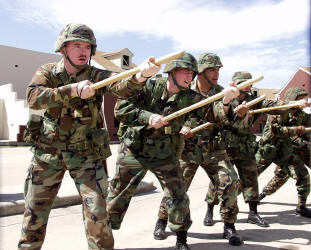
Soldiers from
1st Battalion, 22nd Infantry Regiment, 4th Infantry Division,
practice riot control techniques.
The soldiers are part of Joint Task Force 160 and are
headed to Cuba to provide external security at Camp X-Ray
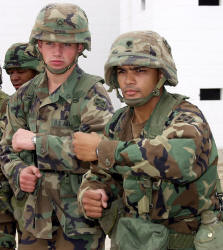
Ironhorse
soldiers strike a defensive pose during riot control training at
the Military Operations on Urbanized Terrain Complex.
Members of the 4th Military Police Company trained the soldiers
on a variety of self defense techniques.
Ironhorse soldiers are headed for Cuba as part of Joint Task Force 160. Approximately 200 soldiers from the 1st Battalion, 22nd Infantry Regiment will take over external security operations at Camp X-Ray, the holding facility for Taliban and al-Qaida detainees. The 1-22 Infantry is also known as Task Force Regulars, a name linked to its 1812-era motto of "Regulars, By God!"
To prepare for the mission, the TF Regulars took part in some unique training at the Military Operations on Urbanized Terrain Complex, or MOUT. Instructors from the 4th Military Police Company taught the infantrymen squad and platoon movements, self defense tactics and riot control techniques.
The soldiers put on a special helmet, picked up a body shield and a baton, and took part in some very realistic training. During a riot control exercise, the soldiers faced a group of protestors throwing "bottles" and carrying clubs. Moving in a protective huddle, the TF Regulars subdued the "rioters" by dousing them with "pepper spray." Once a rioter fell to the ground, two soldiers--called a "Snatch Team," sprang from inside the huddle to pick up the rioter and quickly return behind the shields. Once inside, the soldiers handcuffed the rioter and moved on to repeat the process.
Although controlling a riot is not task these infantrymen regularly do, they made it look that way.
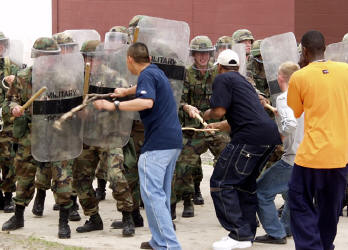
"Rioters," carrying sticks and throwing rocks, confront members of 1st Battalion, 22nd Infantry Regiment, during a training exercise.
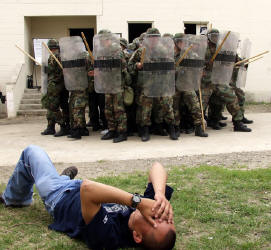
After a dousing with "pepper
spray," a rioter falls to the ground.
The Snatch Team--hidden behind the shields--is ready to spring
out and grab the rioter.
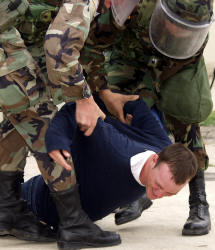
The Snatch Team picks up a rioter. They'll bring the rioter back behind the protective huddle of shields and handcuff him.
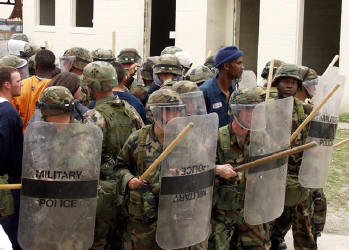
With the rioters subdued and handcuffed, the TF Regulars complete the riot control mission.
Thanks to the 4ID Webmaster, for permission to
use the above story and photos of 1/22 "Task Force
Regulars",
taken from the 4th Infantry Division (Mech) website.
**********************
Hood's "Digitized" unit guarding Taliban detainees
by Master Sgt. Debra Bingham
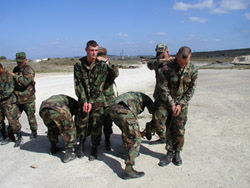
Sgt Steven Sanders and Spec. William
Moyer, far right) Soldiers from the 4th Infantry Division take
turns as detainee and guard.
They are learning the process of preparing detainees for
transport.
(Photo by Master Sergeant Debra Bingham)
FORT HOOD, Texas (Army News Service, April 17, 2002) - Soldiers from Fort Hood's 4th Infantry Division deployed last week to Guantanamo Bay, Cuba, to provide external security for the camp that houses Al Qaeda and Taliban detainees.
The deployment April 6 of the 1st Battalion, 22nd Infantry Regiment, also known as "Task Force Regulars," marked the first time in 10 years that a unit from the 4th Infantry Division has deployed outside of the United States.
Being part of the Army's "digital division" means the TF Regulars have some unique equipment to help them do their mission, according to Maj. Brian Reed, task force commander.
"The FBCB2, or Force 21 Battlefield Command Brigade and Below, is a system that allows us to have a comprehensive operational picture of the area," Reed said. "We can track the progress of convoys and observation points and send secure communication information or traffic."
The infantryman also have the Long Range Advanced Scout Surveillance System, or LRAS3, which is a long-range sensor with thermal capability. It has a powerful sighting system that can zoom in on objects more than 20 kilometers away.
The mission of the infantrymen in Cuba is to provide external security for Camp X-Ray through several different types of operations: fixed site security, patrols, quick reaction, force-reacting to disturbances, and escort and security when the detainees arrive in theater and are transported to the facility, Reed said.
Although some of the tasks are not normally associated with infantrymen, their expertise at patrolling and conducting security operations form a solid basis for the mission, according to Capt. Jason Westbrock, Company B commander.
"We've been through an intense National Training Center rotation on combat operations. Now we're transitioning to a nonlethal-based mission here. It's a change of mindset, so we've trained with the MPs [military policemen] on nonlethal means of controlling situations," Westbrock said.
Before heading to Cuba, the TF Regulars took part in specialized training at Fort Hood with the 4th Military Police Company. Formal instruction and hands-on-training took place at the Military Operations on Urbanized Terrain Complex, or MOUT, giving soldiers an added touch of realism.
With city buildings and burned buses as a backdrop, the Regulars learned squad and platoon movements, self-defense tactics and riot-control techniques. They also picked up some new equipment - helmets, riot shields and batons.
Then they suited up and faced a group of bottle-throwing rioters. It gave the soldiers a chance to test themselves and their new skills.
Spc. John Neal, rifleman, said now that he's in Cuba he's doing a job that offers a different kind of challenge than the one at Fort Hood.
"It's a job where I can't let my emotions or feelings get in the way. I'm going to do the job I've been sent here for," he said.
The skills the TF Regulars learned will serve them well, according to Reed.
"Eleven years ago we had a Cold War focus. We've expanded our horizon of missions since then - with Somalia, Haiti, Bosnia and Kosovo. Now, with the war on terrorism, we need to be able to respond to a different contingency. We're not purely war fighters, we also have to exercise restraint and focus on the humanitarian side," Reed said.
"We are taking part in the President's war against terrorism. We're not just training anymore," Reed said.
(Editor's note: The story was written by Master Sgt. Debra Bingham from the 4th Infantry Division Public Affairs Office, Fort Hood, Texas.)
The above story & photo taken from the US Army's Public Affairs website.
**********************
1-22 Infantry Returns to Cuba
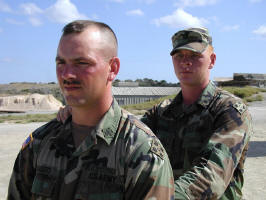
Sgt
Steven Sanders plays the role of detainee, while Spec. William
Moyer practices his job as an escort.
Both soldiers are members of the 1st Battalion, 22nd Infantry
Regiment, 4th Infantry Division from Fort Hood, Texas.
They are deployed to Guantanamo Bay, Cuba as part of Task Force
160.
MSG Debra Bingham, 4th Infantry Division Public Affairs Office
It’s been over 100 years since the 1st Battalion, 22nd Infantry Regiment, 4th Infantry Division last set foot in Cuba. Now, the unit has returned to the island as part of Task Force 160—providing external security for the camp housing al Qaeda and Taliban detainees.
During the Spanish-American War, the regiment was the first Army unit to land at Santiago Bay and it played a key role in the conflict against Spain. The 1-22nd is also known as Task Force Regulars. The name dates back to 1812, when soldiers of the regiment rallied to the motto “Regulars, By God! Deeds Not Words.”
In 1898, 513 Regulars landed in Cuba. Only 165 soldiers survived the war. Their sacrifice is remembered and permanently marked on the crest worn by today’s Regulars, which bears a royal palm commemorating the units’ service in Cuba.
The deployment of the Task Force Regulars on April 6th was also a historical occasion, it marked the 1-22nd Infantry's first deployment outside of the United States in ten years. It’s a mission the soldiers are ready for, according to Maj. Brian Reed, Commander, TF Regulars.
“We’re providing external security for the detainee facility at Guantanamo Bay through several different types of operations: fixed site security; patrols; quick reaction force—reacting to disturbances; and escort and security when the detainees arrive in theater and are transported to the facility,” he said.
Although some of the tasks are not normally associated with an infantryman, their expertise at patrolling and conducting security operations form a solid basis for the soldiers, according to Capt. Jason Westbrock, Commander, Company B.
“We’ve been through an intense National Training Center rotation on combat operations. Now we’re transitioning to a non-lethal based mission here. It’s a change of mindset, so we’ve trained with the MPs on non-lethal means of controlling situations,” he said.
Before heading to Cuba, the TF Regulars took part in specialized training at Fort Hood with the 4th Military Police Company. Formal instruction and hands-on-training took place at the Military Operations on Urbanized Terrain Complex, or MOUT, giving soldiers an added touch of realism. With city buildings and burned out buses as a backdrop, the Regulars learned squad and platoon movements, self defense tactics and riot control techniques. They also picked up some new equipment—helmets, riot shields and batons. Then, they suited up and faced a group of bottle throwing “rioters.” It gave the soldiers a chance to test themselves and their new skills.
Spec. John Neal is a rifleman, now he’s in Cuba doing a job that offers a different kind of challenge. “It’s a job where I can’t let my emotions or feelings get in the way. I’m going to do the job I’ve been sent here for,” he said.
The skills the TF Regulars learned will serve them well, according to Reed. “Eleven years ago we had a Cold War focus. We’ve expanded our horizon of missions since then-- with Somalia, Haiti, Bosnia and Kosovo. Now, with the war on terrorism, we need to be able to respond to a different contingency. We’re not purely war fighters, we also have to exercise restraint and focus on the humanitarian side,” he said.
Being part of the Army’s digital division means the TF Regulars have some unique equipment to help them do their mission, according to Reed. “The FBCB2, or Force 21 Battlefield Command Brigade and Below, is a system that allows us to have a comprehensive operational picture of the area. We can track the progress of convoys and observation points and send secure communication information or traffic.” They also have the Long Range Advanced Scout Surveillance System, or LRAS3, which is a long-range sensor with thermal capability. It has a powerful sighting system that can zoom in on objects more than 20 kilometers away.
With the equipment, the know-how and a proud tradition, 1-22 Infantry is back in Cuba and ready for a different kind of war. It’s a job with meaning for the soldiers according to Reed. “We are taking part in the President’s war against terrorism. We’re not just training anymore.”
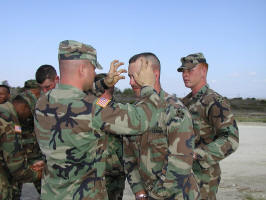
Spec. William Moyer moves his detainee, Sgt Steven Sanders, forward for a head-to-toe inspection before he is transported.
The above story & photos taken from the 4th Infantry Division Home Page
**********************
4ID’s Task Force Regulars Deploy to Cuba
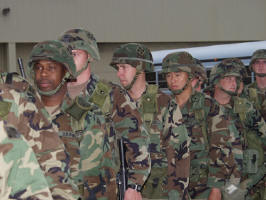
Waiting to board the plane, soldiers of Task Force Regulars begin their mission to Cuba.
Story by Pvt. Andrea R. Kramer
4th Infantry Division Public Affairs
A young mother, Tasha M. Nicholson, holds her 7-week old son, Brady, and fights to hold back tears as she waits to tell her husband goodbye for an unknown length of time. Her husband is one of 200 soldiers making up the Task Force Regulars of the 1st Battalion, 22nd Infantry, 1st Brigade, 4th Infantry Division. The group deployed on April 6 to become a part of Joint Task Force 160 in Cuba.
JTF 160 is the military organization overseeing the detention camp housing al Qaeda and Taliban detainees at Camp X-ray at the US Naval Base, Guantanamo Bay, Cuba.
The scene was an emotional one early Saturday morning at Raider gym. Nicholson wasn’t alone in her grief as soldiers and family members gathered to say goodbye. Sleepy children, some still dressed in p.j's eagerly waited for a chance to see their dads.
“[The hardest part is] having a little bitty baby and him leaving,” Nicholson said about her departing husband. “I’ve never had to deal with this.”
But the ceremony was not all tears. Many soldiers waited in eager anticipation for a chance to see part of the world very few Americans have seen. They were also glad for a chance to put their training into action in a real world mission.
“I’m just happy to be doing something, said Spc. Brian B. Smith of the 1-22nd. “All of us train really hard. We put 110 percent into our training, and we’re all really excited to get out and do something.”
Task Force Regulars, is commanded by Maj. Brian Reed. Maj. Reed feels his soldiers are prepared for any contingency. The group has trained hard to prepare them for the mission. While in Cuba, the task force will conduct dismounted patrols, escort detainees and provide external security for Camp X-ray.
During the task force’s predeployment training, soldiers from the 4th Military Police Company conducted classes on riot control techniques, equipment and tactics for dealing with civil disturbances.
“As I watched the preparation for this important mission, I’ve been struck by your discipline, readiness and your sense of honor.” Maj. Gen. Ray Odierno, commander, 4th Infantry Division, said to the soldiers at the ceremony. “You represent what’s great about our country, our Army and our great division.”
Col. (R) Awbrey Norris attended the ceremony to lend support to the troops. He recalled his deployment to Vietnam in 1967-1968 and 1970, and was impressed with the training and facilities used by the Ironhorse soldiers.
“We didn’t have the type of support then that these troops do today,” said Norris. “I’m just floored to see all of the good care being taken by every agency, through the chain, of how they look after the troops.”
Norris also remarked on the differences between being deployed today versus 20 years ago.
“The world has changed,” he said, referring to the many places that a soldier may be sent. “These are great young men. They can go anywhere and are expected to do anything.”
With one last hug, Tasha Nicholson said goodbye and watched her husband board a bus. Being apart will be difficult for her, but although her spouse is deployed, she knows the 4ID family is there for her.
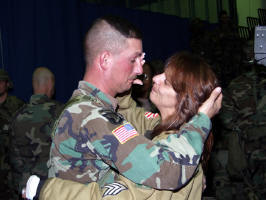
Staff Sgt. Steven Gerard, 1-22 Infantry, shares a last embrace with his wife Valerie at the Task Force's farewell ceremony.
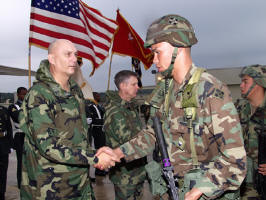
Before he boards the plane, Spc. Jarvis Gibson, 1-22 Infantry, receives well wishes from Maj. Gen. Ray Odierno, commander, 4th Infantry Division.
Much of the above material taken from the 4th ID Website, with the permission of the 4th ID Webmaster.
**********************
1/22 Returns from Cuba
SMILES, CHEERS GREET FORT HOOD SOLDIERS
BY KEVIN J. DWYER,Herald Staff Writer
June 29, 2002
FORT HOOD — Robbi Hammett sat in the sweltering Raider Gym Friday, clutching a disposable camera in her hand, anxiously waiting for her son's return from Guantanamo Bay, Cuba. Sgt. Mark Hammett, a member of 1st Battalion, 22nd Infantry Regiment, 4th Infantry Division, was the second son Robbi sent off to serve in the war on terrorism. Her older son, Sgt. Jeremy Hammett, served with the 10th Mountain Division when it deployed to Asia, and was the first American soldier wounded in Operation Enduring Freedom. "Every time the phone rings you start just a little bit," Robbi said. "I know I'm gong to cry when I see him." On Oct. 9, in southern Uzbekistan, Jeremy was injured when he was pinned between a truck and a water trailer. He has undergone reconstructive surgery at Walter Reed Medical Center and is currently recovering on convalescent leave. Jeremy said he will eventually be medically retired from the Army. "I'm extremely proud of my little brother," Jeremy said. "Having to watch everyone else's prisoners is tough because you're supposed to be taking them yourself. Everybody wants to go blow someone up, but not pick up the pieces."
Known as Task Force Regulars, more than 200 1-22 Infantry soldiers deployed to the U.S. Naval Station at Guantanamo Bay, Cuba, April 6, to join Task Force 160. TF 160 is overseeing the detention camp housing the al-Qaida and Taliban prisoners taken during the conflict in Afghanistan. Led by Maj. Brian Reed, TF Regulars provided the guard force first for Camp X-Ray, and later for Camp Delta, a more permanent detention facility that was built earlier this year. "It was a great experience for us," Reed said after arriving at Robert Gray Army Airfield. "The toughest part of the mission was getting settled in. We got settled at X-ray, we moved to Delta. Once we got a routine it was easier."
The first person the TF Regulars soldier saw when they got off the plane was Maj. Gen. Ray Odierno, commanding general of 4th ID. Odierno was there to shake each soldier's hand and welcome them back. When the Task Force Regulars soldiers finally walked through the door, the cheers of the families drowned out the music of the 4th ID band. Robbi and Jeremy carefully scanned the faces of the soldiers coming in through the double-doors with anxiety etched on their faces.
When Mark finally walked in, Robbi's face lightened with a smile. Her son was finally home. "It's always good to have them home," said Lt. Col. Gary Hammett, the husband and father of the group. "I don't worry too much. They do what they're trained to do." Odierno said he was especially proud of the soldiers since many of them, prior to the three-month deployment to Cuba, had just returned from a training rotation at the National Training Center at Fort Irwin, Calif. "A lot of these soldiers have been gone since January," Odierno said. "I want to thank the family members for all they do every day. We can never thank you enough for what you do." Jeremy said he and his brother have a pretty good rivalry going due to the fact he is a light infantryman and Mark serves with a heavy mechanized infantry unit. "I like to point out the new anti-tank technology we have," Jeremy said with a smile. "It's going to be interesting at supper," Gary said.
For Mark, the most difficult part of the Guantanamo Bay deployment were the long hours spent guarding the prisoners, a schedule that usually ran six days on, then two days off. "If there was a detail we did it," Mark said. "It's not easy, but it's something you've got to do. It's part of the job." Still smiling after the reunion with her younger son, Robbi, and her family prepared to leave the gym and continue their celebration. "We've got one more trip to make to Walter Reed," Robbi said of Jeremy's future, then pointed at Mark. "Now I know I can make that trip knowing this one's OK.
Above story from the Kileen Daily News, June 29, 2002 http://www.kdhnews.com/texas.html
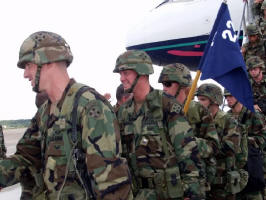
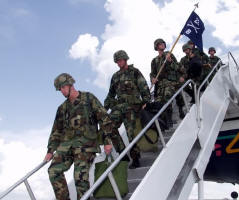
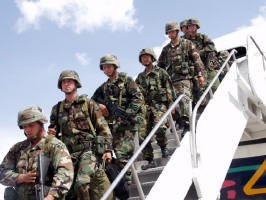
1/22 Returns from Guantanamo Bay, Cuba----June 2002
**********************
Home | Photos | Battles & History | Current |
Rosters & Reports | Medal of Honor | Killed
in Action |
Personnel Locator | Commanders | Station
List | Campaigns |
Honors | Insignia & Memorabilia | 4-42
Artillery | Taps |
What's New | Editorial | Links |